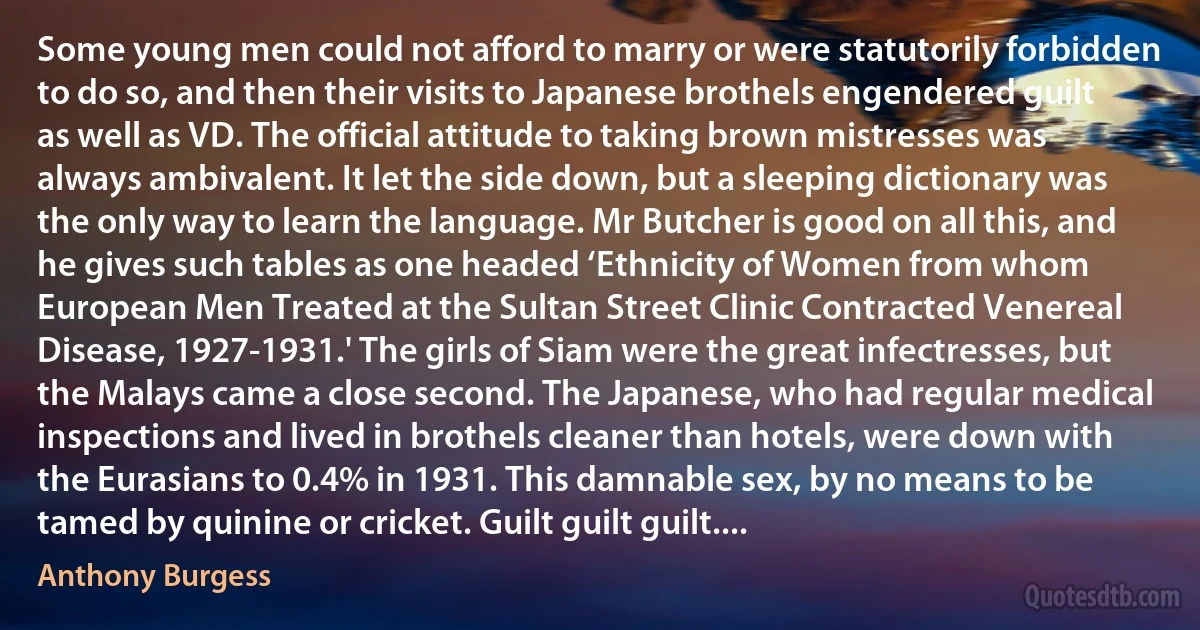
Some young men could not afford to marry or were statutorily forbidden to do so, and then their visits to Japanese brothels engendered guilt as well as VD. The official attitude to taking brown mistresses was always ambivalent. It let the side down, but a sleeping dictionary was the only way to learn the language. Mr Butcher is good on all this, and he gives such tables as one headed ‘Ethnicity of Women from whom European Men Treated at the Sultan Street Clinic Contracted Venereal Disease, 1927-1931.' The girls of Siam were the great infectresses, but the Malays came a close second. The Japanese, who had regular medical inspections and lived in brothels cleaner than hotels, were down with the Eurasians to 0.4% in 1931. This damnable sex, by no means to be tamed by quinine or cricket. Guilt guilt guilt....
Anthony BurgessRelated topics
butcher came cleaner clinic close disease gives good great guilt women men language learn second side sleeping street taking venereal way well young means ethnicity girlsRelated quotes
This damnable sex, boys - ah, you do well to writhe in your beds at the very mention of the word. All the evil of our modern times springs from unholy lust, the act of the dog and the bitch on the bouncing bed, limbs going like traction engines, the divine gift of articulate speech diminished to squeals and groans and pantings. It is terrible, terrible, an abomination before God and His Holy Mother. Lust is the fount of all other of the deadly sins, leading to pride of the flesh, covetousness of the flesh, anger in the thwarting of desire, gluttony to feed the spent body to be at it again, envy of the sexual prowess and sexual success of others, sloth to admit enervating day-dreams of lust. Only in the married state, by God's holy grace, is it sanctified, for then it becomes the means of begetting fresh souls for the peopling of the Kingdom of Heaven.

Anthony Burgess
There is a process of slow modification and development mainly in directions which I view with misgiving. "Tory democracy," the favourite idea on that side, is no more like the Conservative party in which I was bred, than it is like Liberalism. In fact less. It is demagogism ... applied in the worst way, to put down the pacific, law-respecting, economic elements which ennobled the old Conservatism, living upon the fomentation of angry passions, and still in secret as obstinately attached as ever to the evil principle of class interests. The Liberalism of to-day is better ... yet far from being good. Its pet idea is what they called construction, - that is to say, taking into the hands of the State the business of the individual man. Both the one and the other have much to estrange me, and have had for many, many years.

William Ewart Gladstone
We have to stop pretending that Islam is merely a religion-it is primarily a totalitarian ideology that aims to conquer the West. A free society should not grant freedom to those who want to destroy it. Every halal shop, every mosque, every Islamic school, and every burka is regarded by Islam as a step toward the ultimate goal of our submission. As such, we must close down all Islamic schools, for they are totalitarian institutions where young children are indoctrinated into an ideology of violence and hatred. We must also close down all radical mosques and forbid the construction of new mosques, which Islam regards as symbols of its triumph. And we must ban the burka-people's faces should not be hidden in society, for it is our faces that give us our identity and our fundamental means of communication with others.

Geert Wilders
My specific... object has been to contain, within the prescribed limits, the whole of the student's course, from the confines of elementary algebra and trigonometry, to the entrance of the highest works on mathematical physics. A learner who has a good knowledge of the subjects just named, and who can master the present treatise, taking up elementary works on conic sections, application of algebra to geometry, and the theory of equations, as he wants them, will, I am perfectly sure, find himself able to conquer the difficulties of anything he may meet with; and need not close any book of Laplace, Lagrange, Legendre, Poisson, Fourier, Cauchy, Gauss, Abel, Hindenburgh and his followers. or of any one of our English mathematicians, under the idea that it is too hard for him.

Augustus De Morgan
In France at least, the history of science and thought gives pride of place sciences, sciences of the necessary, all close to philosophy: one can observe in their history the almost uninterrupted emergence of truth and pure reason. The other disciplines, however - those, for example, that concern living beings, languages, or economic facts - are considered too tinged with empirical thought, too exposed to the vagaries of chance or imagery to age old traditions and external events, for it to be supposed that their history could be anything other irregular. At most, they are expected to provide evidence of a state of mind, an intellectual fashion, a mixture of archaism and bold conjecture, of intuition and blindness. But what if empirical knowledge, at a given time and in a given culture, did possess a well defined regularity.

Michel Foucault
